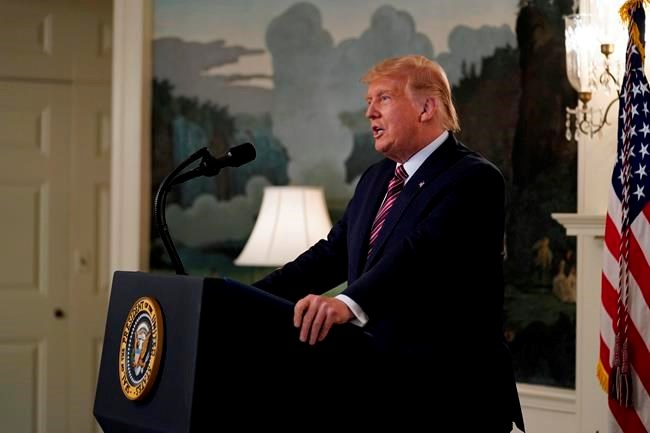WASHINGTON — Donald Trump taxied into Michigan on the heels of his Democratic challenger Thursday, hoping to use NAFTA and China to slow Joe Biden's momentum in a Rust Belt state that's vital to his effort to stay in the White House.
In a Saginaw County airplane hangar with Air Force One as his presidential backdrop and all the usual "Make America Great Again" trappings, Trump excoriated his rival for more than an hour, lingering on the former Delaware senator's support for the original — and much-hated — North American Free Trade Agreement.
"You've been ripped off," Trump thundered, blaming NAFTA for sending auto manufacturing jobs to Mexico "and, by the way, to Canada, too," he said.
"I kept my promise to Michigan workers when we ended the NAFTA nightmare that everybody said was impossible to end, and when we signed that brand new U.S.-Mexico-Canada Agreement into law."
The USMCA's "powerful wage protections" will bring good-paying auto jobs back to hollowed-out working-class states like Michigan, Trump said.
Now, he said, U.S. manufacturers "have a tremendous disincentive to leave Michigan, fire all of our workers, Mexico or Canada make the car or the product, send it in here without tariffs. We end up with closed factories, no job and no taxes. That's not happening anymore."
Biden, Trump noted, even acknowledged the USMCA is "better than NAFTA" during a CNN interview aired Thursday.
"He just said (NAFTA) was not as good as the deal I made. Oh boy, are they giving him hell tonight: 'What did you say that for?'"
In the interview, Biden countered by suggesting the deal he supported was ultimately not the one that went into effect, because the Republicans under George Bush failed to live up to a commitment to add enforcement clauses — long considered one of the original deal's biggest shortcomings.
He also described the work he did as vice-president to implement the 2009 Recovery Act, the $800-billion Great Recession stimulus package that stoked protectionist fears in Canada because it initially prohibited the use of foreign materials and contractors for U.S. infrastructure projects. Canada managed to negotiate a waiver that took effect in 2010.
Biden, who made his own campaign stop Wednesday in Michigan, is trying to shore up support among blue-collar Americans by borrowing a page from Trump's protectionist playbook, promising a suite of so-called Buy American measures designed to ensure the country's post-pandemic recovery efforts primarily benefit Americans.
As president, he said he would impose stiff tax penalties on companies that manufacture U.S.-bound products outside the country and crack down on those that use offshoring to avoid paying taxes at home.
Biden also promised to "expand and tighten" Buy American provisions and establish a "Made in America" office in the White House to review and limit exceptions to the rules — exceptions many Canadian firms depend on.
Don't buy it, Trump urged his supporters.
"I'm running against the worst presidential candidate in the history of presidential politics," he said, accusing Biden of being soft on China and warning that a Democrat in the White House would mean even more jobs migrating out of the country.
"I took the toughest-ever action to stand up to China's rampant theft of Michigan jobs," he said. "Biden has vowed to remove these tariffs and allow China to resume its pillaging. You remember how bad it was just before I took office? It was like an avalanche of companies leaving our country."
Trump also continued to lay the blame for COVID-19 squarely at China's feet, even though back in Washington he spent the day fending off yet another when-did-he-know-it controversy about what he was telling Americans about the pandemic back in February.
A new book from storied Watergate reporter Bob Woodward documents several tape-recorded interviews from the early days of the crisis in which Trump acknowledged the virus was deadlier than the seasonal flu and spreading through the air. Publicly, however, he insisted the outbreak was under control and would likely fade away by spring.
In a surprise news conference Thursday, he flatly denied lying, insisting he was merely trying to show leadership and avoid panic.
"There was no lie here," he said. "It's always a serious problem. That doesn't mean I'm going to jump up and down in the air and start saying, 'People are going to die, people are going to die' — no, I'm not going to do that."
He even went so far as to suggest Woodward, a 49-year veteran of the Washington Post, agreed it was no secret in February that the virus was serious, and would have reported what he knew sooner had he felt otherwise.
Woodward has acknowledged holding on to the material, but insisted it was because he was unable to confirm the details until May — and because he was focused on ensuring the book was published before the Nov. 3 presidential election.
This report by The Canadian Press was first published Sept. 10, 2020.
— Follow James McCarten on Twitter @CdnPressStyle
James McCarten, The Canadian Press



